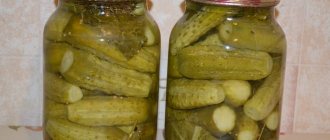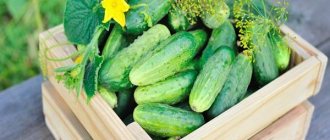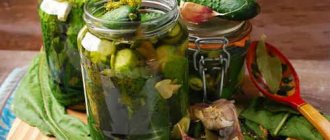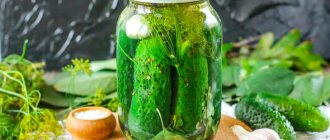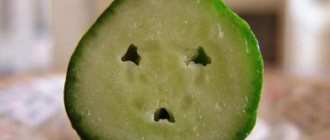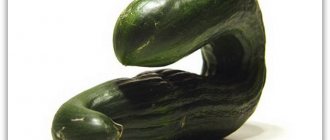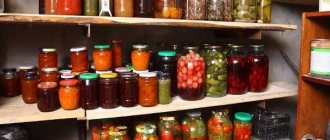What to do if the brine in cucumbers becomes cloudy?
Not every person dares to eat cucumbers that have been in a cloudy solution for a long time. You cannot leave the product in this state, otherwise it will not have a very positive outcome. Cloudy water is the first sign that the jar will soon explode
.
Another option is that the water will soon acquire a light color, but the cucumbers will then dramatically change their taste and can only be used for making pickle sauce. In order not to spoil the long-awaited fruits, you need to take action
as soon as the marinade becomes cloudy:
- The jar in which the cucumbers are located must be opened
and all contents carefully
removed
from it. If there is no time for this procedure, then just drain the solution; - Cucumbers need to be washed
with boiling water. If they are left in the jar, you can rinse them with warm water directly in it; - Next, you need to fill the container with boiling water
and leave it for 5 minutes; - After five minutes, the salted water must be poured into the pan, after which the marinade can be made again;
- The resulting liquid must be poured back into the jar and the container sealed with a lid.
It is not necessary to throw away cucumbers if the solution becomes cloudy. You can save the product in a simple way.
Pickled cucumbers have fermented, become cloudy, the lid is swollen: what to do, how to save it, how to remake it?
Saving marinades
Not everyone, even the most avid lover of pickles, will decide to try vegetables that have been in a cloudy solution for a long time. Since a cloudy marinade indicates improper preparation of the product, which, at best, will lead to a change in the taste of the product: the cucumbers will become soft and sour, at worst, the lid will soon swell or completely break off, and the cucumbers will become unsuitable for consumption.
Therefore, in order not to regret the time wasted preparing a snack, when the above signs appear, we take urgent measures:
- Open the jar of cucumbers
- Pour out the brine
- We wash the cucumbers with warm boiled water without removing them from the container.
- Pour boiling water over vegetables
- Let sit for 5 minutes, covering with a lid.
- Then pour the water into a saucepan and bring to a boil.
- Pour salt and spices into the jar according to the chosen recipe
- Roll up cucumbers
- If desired, salt can be poured not into a container, but boiled with water
Not everyone likes this widespread method; many craftsmen have gotten used to using their own, proven methods:
- Do not open the jar with a swollen lid, just pour a large handful of salt on it. After some time, the lid will lower and the brine will become transparent. The cucumbers will acquire a slight sourness, but you won’t have to open the jar and over-salt the vegetables.
- Marinade prepared with the addition of 3 tbsp does not change the taste of cucumbers. vodka. But to do this, you will have to do the above manipulations with opening the jar and salting the cucumbers.
- Often the jars begin to “play” and the lids swell. To calm them down while still retaining all the flavor of the cucumbers, use a can opener to release a little air. But be very careful so that the lids and rubber seals remain intact. Fermentation will end and the lid will snap into place.
- A very simple method, from our grandmothers: pour tomato juice over completely exploded cucumbers. This method makes the vegetables very crispy and tasty. Helps even in the most hopeless situations.
Canned cucumbers have become cloudy - what to do?
Situations arise when it is not the solution that becomes cloudy, but the canned cucumbers themselves. This is a normal sign if it occurs the first day after salting. However, if this effect lasts more than 4 days
, then the product is considered spoiled.
First you need to taste them. Naturally, this needs to be done in small quantities. If cucumbers are bitter, it is better to throw them away, otherwise consuming them can harm human health. If the taste is normal, then you can try to over-salt
. This requires:
- Open the damaged jar;
- Drain the marinade into a saucepan;
- Get the cucumbers;
- Rinse them with warm water;
- Place back into jar;
- Pour over the heated marinade.
Sometimes the cause of cloudy cucumbers is the preparation of the wrong marinade. Therefore, to improve the effect, it is advisable to prepare a new brine.
How to avoid exploding cucumber jars
For the cans to stand well, it is not enough to roll them up correctly. Proper storage of canned food also plays an important role.
Sealings should be stored in a cool, dark place. Cellars, basements and cold storage rooms are suitable for this. In hot weather, the risk of canned food explosions increases, so you need to monitor the room temperature.
Canning vegetables for the winter is a common practice for gardeners. This is especially true for pickling cucumbers, where in addition to the product itself, the brine is valued, which effectively quenches thirst and is also in demand among home confectioners.
Salt water and cucumbers turn white, as a result of which some prepared jars swell and may become unusable. Efforts and labor will not be in vain if you regularly ensure that the jars in which the cucumbers will be preserved do not swell.
Why do cucumbers turn cloudy?
Cucumbers don't just turn cloudy. This only happens if the process of their preparation technology is disrupted. There are several main reasons:
- The utensils for preparing cucumbers are not selected correctly. You need to take jars of high quality, suitable for consumption. Even if there are minor cracks in the neck, it is no longer possible to salt them. They must first be washed with warm water with a small addition of soda. Then the container must be rinsed thoroughly;
- Another reason is insufficient sterility. Here we are talking about the brine itself and the jar in which you are going to preserve the cucumbers. Before you start pickling, you need to hold the jar over boiling water for a few minutes. The jar is considered ready for use only when drops of evaporation begin to appear on its bottom. Each cucumber and spices also need to be thoroughly washed;
- In most cases, cloudiness occurs due to the lid not being tightly closed. This work is beyond the strength of a fragile girl, so it is better to entrust it to a man. The lid must be rolled up so tightly that not a single microorganism can penetrate the container;
- Even if all points are followed, cucumbers can still become cloudy. The reason for this is the incorrect cooking recipe. For example, acid and vinegar were not used. As a rule, the purity of the solution itself depends on them. Even the wrong salt can affect the quality of the product;
- The last important factor is proper storage of the product. If pickling occurs in the cold season, then the cucumbers should stand in the room for no more than three days. Storage itself should be carried out only in rooms where the temperature is up to 7 degrees
.
If all the rules were followed during pickling, then the cucumbers will be suitable for consumption for several years.
You can watch a video in which Elena will tell you a recipe for pickling delicious cucumbers in a jar:
Experienced housewives claim that if you first remove all microbes from the container, the cucumbers will not become cloudy. To do this, you need to completely fill the jar with boiling water and close it with a lid for 10 minutes. All bacteria that were in it will die.
You should also check each cucumber before pickling. If you get at least one rotten fruit in the container, the entire marinade will quickly become cloudy.
Cooks also say that it is necessary to select a recipe for each variety of cucumbers; only in this case can you get a tasty, crispy product.
What can cloudy and swollen jars mean?
It’s an offensive situation for any housewife when, after much effort in processing and preservation, the brine in a jar of cucumbers begins to become cloudy.
Why is this happening? Is there any danger in using such products? Is it possible to preserve cucumbers by changing the brine ?
We will try to give answers to these questions in our article.
Reasons why brine in jars of cucumbers becomes cloudy
All reasons can be divided into several categories. The first includes insufficiently careful selection of pickling cucumbers, the second is the sterility and composition of the brine, and the third is storage conditions.
- When preparing cucumbers for pickling and pickling, vegetables with signs of rot were omitted.
- Purchasing vegetables from a manufacturer who used large amounts of nitrates.
- We used salad varieties that are difficult to preserve. Vegetables that are good for pickling can be identified by the presence of prickly fibers. Cucumbers with dark fibers have high evaporative abilities. Their dense pulp lends itself well to pickling and can be stored for a long time.
- Inside some cucumbers there is a small cavity filled with air, which can have a bad effect on the pickling process. Soaking vegetables in cold water helps eliminate this problem .
- When selecting dishes, jars with cracks and chips on the neck are not rejected. This gave a poor-quality seaming.
- The jar is not prepared enough . The procedure was to include washing the jar with a soda solution, and after rinsing in clean water, sterilizing over boiling water. Using detergents instead of soda often leads to spoilage of the pickling.
- Dirt particles from poorly washed vegetables and pickling spices could cause rotting.
- In cases of salting using iodized or sea salt, some preservative components cause cloudiness.
- Canning took place without the use of citric acid or vinegar.
- Violation of the technique for sterilizing jars with pickling or insufficient sterility of the lids. The development of microorganisms in the brine caused it to become cloudy and caused the lid to bulge.
- The lid did not close tightly and the contents were not sealed. The situation may arise due to cracks in the neck of the jar or insufficient sealing with a seaming key.
- The jars of cucumbers stood in a warm room for more than three days after sealing.
- In the storage area for pickling, the temperature exceeds 7 degrees.
How dangerous is it to eat food from such jars?
Microorganisms that cause the fermentation process in jars can be of both safe and pathogenic origin. This could be lactic acid , which itself is a natural preservative, or dangerous botulism microbes.
Unlike canned food, traditional barrel cucumbers have never been contaminated with botulism. Insufficient acidity and sealed preservation in glass jars lead to the creation of anaerobic conditions suitable for the development of such microbes.
Cucumbers that were lying on the surface of the soil before pickling could become infected with pathogenic spores. Heat treatment did not cope with them. The bacterium that causes the disease is Clostridium.
If ingested, this toxin causes severe illness and possible death. A bulging lid is one of the signs that such canned food is dangerous.
Infection with clostridia does not occur in lightly salted cucumbers and occurs much less frequently in pickled canned food. This is due to the fact that in the first case there is no anaerobic environment, and in the second situation the composition of the marinade has a more acidic environment, in contrast to conventional salting. High acidity of the environment blocks the proliferation of these bacteria.
What to do with such banks?
Only cucumbers from jars with cloudy brine, on which the lids are not swollen, are suitable for recycling. In these cases, the cucumbers are washed, immersed in boiling water for five minutes and filled with new sterile brine.
The benefits of canned cucumbers
If you managed to pickle cucumbers correctly, then in winter you can get an irreplaceable source of vitamins. This product contains lactic acid. It is this substance that improves digestive processes. It can also help lower blood pressure and remove lipids from the human body. Therefore, pickles are not only a dish of amazing taste, but also a source of vitamins.
Thus, it became clear that if the cucumbers became cloudy, what to do in this case. It is important to correctly follow the recipe for preparing the product and maintain the sterility of each component. If everything is done correctly, then the hostess will be able to show off her magnificent homemade preparations to her friends.
Video about canned cucumbers
“Darling, did I have too much yesterday? - Gosha, you were a cucumber. - Well done or what? Vegetables, dear.” You can still tell a whole carload of jokes about cucumbers, but it’s better to feast on them. Canned cucumbers are especially tasty and crunchy. But here’s the problem: you took out a jar, and the brine looks like dregs. What to do if the cucumbers become cloudy? We will draw up a plan for their rehabilitation.
Conservation pitfalls
Summer and early autumn are the period of preparations. And every housewife tries to roll up as many cans of vegetables and fruits as possible. Cucumbers are considered the main preserved food. How nice it is in winter to open a jar of crispy green vegetables and enjoy them with potatoes!
But sometimes unpleasant moments darken our happy life. Imagine that you take out a jar of canned cucumbers from the cellar, and the brine is not only cloudy, but looks like a small swamp. Do not rush to dispose of the product, we will try to save it.
What to do if pickled cucumbers become cloudy? First you need to find out the reason, because if you do not figure out the source of the problem, you will not be able to insure yourself against such excesses in the future. In everyday life, almost every housewife has encountered this phenomenon. Based on life experience, you can make a list of reasons why cucumber pickle may become cloudy, in particular:
- Before canning, you did not soak the cucumbers or did not wash them properly. Result: dirt particles became an activator of the putrefactive process.
- Glass containers have not been sterilized or have been washed using chemicals. Residues of detergent may cause the brine to lose clarity.
- Added spices, for example, bay leaves, currants, horseradish, have not been pre-treated or showered before preservation.
- To pickle cucumbers, sea salt or iodized salt was used. These types of salt contain particles that provoke the clouding process.
- Lids were not sterilized or were not sealed tightly.
- The glass container has cracks or chips. Air is not the most favorable ally of conservation.
There is another reason that does not at all depend on the method of conservation and is not related to the negligence of the housewife. These are low-quality cucumbers loaded with chemicals. Even soaking will not save such an unclean vegetable.
Reasons for cloudiness of cucumbers in jars
There may be several explanations for such strange behavior of salted or pickled vegetables, and each one is fraught with a separate reason. It happens that the solution, along with the cucumbers, simply turns white and nothing else happens. It is believed that nothing happens by itself, which means we need to look for the root causes of such strange phenomena.
They are most often the following:
- The cucumbers were not washed well enough; small particles of debris and soil remained on them, which, being in a confined space, led to fermentation. This also includes contamination that gets in with spices for preservation.
- The problem is with the jars: they were dirty or synthetic products were used to wash them (usually it is recommended to use chemically neutral and harmless baking soda).
- Instead of ordinary table salt, sea or iodized salt was used - they contain components that cause gradual clouding of the brine.
- Poor sterilization of jars and lids, not only empty ones, but also at the final stage, when processing is performed before sealing.
- Low-quality lids, chips or cracks in the neck - all this leads to air getting inside and inevitable fermentation.
In addition to those mentioned, there are reasons that have nothing to do with the conservation process. These are cucumbers that contain a large amount of chemicals (nitrates), are too old, or varieties that are not intended for long-term storage.
Important. Experience in the home matters more than the smartest advice. If you don’t know how to solve the problem of why the lids are swollen, or you’re not sure of a successful outcome, it’s better to throw away the spoiled canned food and try to do everything right.
Health is more valuable than experiments in the kitchen, especially with questionable results.
Let's try to rehabilitate conservation
What to do if the cucumbers become cloudy and the lids are swollen? Almost every housewife has encountered such an unpleasant phenomenon. If you notice that the lids have acquired convex shapes, then such preservation should most likely be disposed of. Nothing will help her - only the trash heap. Do not delay the process of destroying such cans, otherwise an orchestra of exploding tin lids will begin to play in your basement or cellar. And it will take a long time to get rid of the unpleasant musty smell of spoiled brine.
But there are situations when canned cucumbers can be given a second life. Let's find out what to do if the cucumbers become cloudy in the jar. Let's simulate several situations:
- If you notice that the cucumber pickle has become cloudy literally 2-3 days after preservation, then this is the most favorable situation. The brine needs to be drained, the cucumbers should be washed thoroughly, preferably with boiling water, and then rolled back into jars. Yes, don't forget to check all the ingredients in the recipe and add vinegar this time.
- Cloudiness of cucumber brine is the result of lactic acid fermentation. You can resort to the following trick. Place the jar of pickled cucumbers in the refrigerator for 7-10 days. Conduct a so-called experiment and do not forget to record your observations every day. In some cases, all the turbidity will settle at the bottom of the jar, and the brine will again become crystal clear, like God's dew.
- You can prepare a new brine. In this case, repeat the preservation procedure from A to Z. Do not forget to scald the cucumbers with boiling water. This can be done directly at the bank.
If the cucumber pickle cannot be restored to its original appearance, try to dispose of such preservation, because its cloudiness may be due to the growth of bacteria. Some housewives resort to this trick: they wash canned cucumbers with boiling water and then add them to the pickle. After heat treatment, not a single microbe or bacteria will survive.
Cucumbers in a jar are cloudy: the main reasons, what to do and how to fix it, video
The main mistake that leads to canned cucumbers turning white and exploding after closing is insufficient sterility. Read below to find out how to fix it.
Why do cucumbers in a jar become cloudy: the main reasons
There are several reasons why pickled cucumbers become cloudy and the lid on the jar swells:
- the use of poorly washed raw materials - cucumbers, herbs, spices;
- using cucumbers without pre-soaking;
- the use of raw materials grown using large amounts of chemicals;
- preservation of overripe cucumbers;
- low-quality salt and lids;
- replacing regular salt with iodized salt;
- lack of proper processing of kitchen utensils intended for canning;
- lack of a preservative (vinegar, citric acid, aspirin) or too small an amount;
- depressurization of lids;
- violation of cooling technology;
- improper storage.
Another reason explaining why jars of cucumbers explode, as the sign says, is canning on critical days. It is impossible to say whether this is true or not, and what provoked such a statement. However, most of the fair sex today refuse to prepare preparations for the winter on “these” days.
What to do if the brine in cucumbers becomes cloudy?
Whether it is possible to save pickles if they become cloudy depends on how long the product has been in the spoiled brine.
In addition, if after twisting the cucumbers in the jar fly up, the water becomes cloudy, and the lid is swollen, then the situation will not be corrected. The only way out is to throw away the spoiled products.
If the integrity of the lid is preserved, and the pickles are only slightly darkened, you can try to redo the filling and roll the products again.
Important! If after cooling the brine becomes cloudy, and after 24 hours it becomes clearer, this is a natural process and nothing needs to be done.
The sequence of actions is as follows:
- Drain the brine.
- Smell the products and test their taste.
- Sterilize another jar of similar volume.
- Place the cucumbers in a sterilized bowl and pour boiling water over them 2-3 times.
- Make a new saline solution (per 1 liter of water: spices, 60 g salt, 100 g sugar, 2 tbsp 9% vinegar).
- Place 2 cloves of garlic, cut into circles, on the bottom of a new container, then cucumbers and herbs.
- Fill the jar with new solution up to the neck so that there is no room for air and roll it up.
What to do when cucumbers in a jar become cloudy
Another method will be relevant if the lid is swollen quite a bit, and a white, almost transparent sediment appears at the bottom of the jar:
- Place the jar in the refrigerator on the bottom shelf for 6-7 days - when the temperature drops, the fermentation process stops and the lid is pulled back.
- After this, the products should be used as quickly as possible.
Another method involves partial depressurization. It is quite difficult to perform, so it is used much less often. Using a can opener, slightly lift the edge of the lid to release the accumulated carbon dioxide. The main thing is that after this manipulation, the elastic band sticks tightly to the neck again.
Is it possible to eat cloudy cucumbers in a jar?
If the cucumbers turn sour or mold appears on them, then you should not consume such products. Also, pickles that have exploded should not be consumed.
If, when canning with citric acid or vinegar, the greens in the jar became darker, and after a few days they turned white, then the products are quite suitable for food. It is better not to take risks, but to open the jars and eat lightly salted products.
If cucumbers do not emit an unpleasant odor and are not bitter, they can be used to prepare pickle soup, solyanka, and sauces for meat dishes.
Important! Before canning, greens must not only be thoroughly washed, but also soaked in cold water for 30 minutes.
How to prevent brine cloudiness
There are several ways to prevent cucumber pickle from becoming cloudy:
- soaking greens for several hours before using;
- thorough cleaning of all raw materials used from contaminants, including rinsing whole spices with boiling water;
- washing cans with soda and then sterilizing;
- mandatory use of a preservative in the form of vinegar or citric acid; it is better to avoid aspirin or use it extremely rarely.
Useful tips for pickling cucumbers
A few practical tips will help you make your preparations more tasty and keep them longer:
- To ensure that the greens crisp and the brine remains transparent, after filling the jar with raw materials, place a clove of garlic and a horseradish leaf on the very top. These products have antiseptic properties and therefore prevent fermentation.
- Use lids made of stainless steel.
- To preserve and improve the taste, always place a few circles of horseradish root or hot pepper at the bottom of the jar.
- Add sour fruits to the jars - they will increase the effect of the preservative. Greenish cherry plum, a slice of sour apple or red currant are suitable.
Find out more about the best recipes for pickling cucumbers in a pan for the winter.
There are several techniques to correct the situation with cloudiness of the brine in pickled cucumbers. However, it is better to carefully follow the process technology and nip such unpleasant surprises in the bud.
Source: https://fermer.blog/bok/ogorod/ogurcy/recepty-zagotovok-ogurcov/problemy-konservirovaniya-ogurcov/2654-pomutneli-ogurcy-v-banke.html
Shall we crunch some cucumbers?
If you are just at the beginning of your culinary journey, we will tell you how to properly preserve cucumbers so that you never encounter cloudiness in the brine. The vegetables will be firm, crispy, aromatic and incredibly tasty. Their secret is compliance with all the rules of preservation, recipe proportions, as well as a little patience.
Compound:
- 1 kg of cucumbers;
- 6 pcs. garlic cloves;
- 6 pcs. dill umbrellas;
- chili and peppercorns to taste;
- 3 pcs. laurel leaves;
- 50 ml table vinegar with 9% concentration;
- horseradish leaves;
- 1 tsp. table salt;
- 2 tsp. granulated sugar.
Preparation:
Canning homemade products is not easy work. You need to collect vegetables or fruits at the dacha, bring them home, wash, peel, and possibly chop or grate them. Then you need to prepare the jars and lids - wash, sterilize or dry.
The canning process itself is difficult and hard work in a hot kitchen. But how the housewife’s heart rejoices at the sight of rows of multi-colored jars in the pantry! And how great is the disappointment when you see that the lids on the jars are swollen, and some are even torn off.
Why do preserved jars swell?
The reason that causes jar lids to swell is the activity of microbes. Once in a favorable environment full of nutrients, the microbes that survived sterilization begin to actively multiply. The environment itself favors them: a warm, humid environment, protected from direct sunlight - the best conditions for the proliferation of most microorganisms.
During their life, microbes release gases - carbon dioxide, hydrogen sulfide. It is these gases that cause the lids to swell - the pressure inside the jar increases, and the thin metal of the lids rises. In some cases, the pressure is so strong that the lid cannot withstand it and falls off the jar.
They usually say that a can has “exploded,” and sometimes it really does look like an explosion—its contents may partially spill out of the container, staining neighboring cans. This phenomenon is usually called the French word “bombage”, and a jar with a swollen lid is called a bomb jar.
Failure to comply with conservation rules
The main reason why microbes get inside a closed jar is non-compliance with the recipe and preservation rules. To ensure that all microorganisms are killed, you must:
- rinse vegetables or fruits thoroughly, removing the slightest lumps of earth stuck to the peel;
- clean the stems, throw away all rotten fruits that can serve as a source of infection in the jar;
- strictly follow the recipe, do not reduce the amount of preservatives - sugar, salt, vinegar, pepper;
- sterilize the jar for as long as indicated in the recipe, paying attention to its volume: three-liter jars are steamed for an hour, liter jars for at least half an hour, half-liter jars for 15-20 minutes;
— before closing, thoroughly rinse and sterilize the lids, as they may also contain dirt or germs;
- use a working seaming machine, make sure that the elastic bands of the lids do not come out from under the tin and fit tightly around the neck of the jar;
— control the quality of seaming by turning the jars over.
If everything is done correctly, preservation lasts in the pantry until spring, and even in the underground for several years.
Is it possible to eat canned food from a swollen jar?
The only canned foods that can be eaten after the lid is blown are those preserved in brine or marinade. The preparation of these vegetables is often done by ripening in a jar or barrel. However, it all depends on how far the work of microorganisms has gone: sometimes even cucumbers in a swollen jar acquire such an unappetizing smell that it is immediately clear that this cannot be eaten.
It is better to throw away the rest of the canned food after the lid swells, without finding out the degree of spoilage of the product. The fact is that in a closed and steamed jar, as a rule, only one microbe survives - botulinus, which during the reproduction process releases a deadly toxin.
After eating a product poisoned by botulinus poison, a person can very easily become poisoned, and even the efforts of modern medicine do not always save the lives of such patients. Therefore, it is better not to risk your health and throw away the contents of a swollen jar, no matter how sorry you are for your efforts and the money spent - health is more valuable in any case.
Is it possible to eat pickled cucumbers in cloudy brine?
Is it worth the time to re-salt exploding marinades?
There are a lot of radically opposing opinions about eating such products: from various recipes to throwing them away without a second thought.
And yet, most housewives are inclined to this conclusion:
- Cucumbers whose brine has become cloudy cannot be restored when sealed tightly with a lid.
- After the bombing, it is strictly forbidden to use the spoiled product for food. This can lead to severe poisoning. In this case, you shouldn’t even speculate about why the cucumbers turned cloudy. Just throw them away.
- But vegetables prepared using the salted method, that is, closed with nylon lids, can be restored using the above methods.
Salting cucumbers correctly
If the technological process for preparing marinades is generally followed, jars of cucumbers do not become cloudy or explode.
A few additional tips will help housewives protect their products from loss of quality and beautiful appearance:
- The main enemy of preservatives is dirt. Wash dishes, vegetables, and herbs thoroughly. Rinse the jars with soda until they “squeak.” Pay special attention to the neck. Check for integrity, scald with boiling water. Sterilize the container for at least 15-20 minutes.
- Use white tin lids, varnished or stainless steel. They protect the products from fermentation.
- Soak cucumbers for 6-12 hours before pickling, and greens for 1.5-2 hours.
- The following will help to avoid fermentation: citric acid, aspirin or vodka.
- Choose small and vigorous fruits for preservation, without a yellow coating.
- Avoid crooked and short vegetables. They spoil quickly.
- Do not can overripe fruits. Their internal emptiness can cause air to accumulate, which leads to fermentation.
- Add a few tomatoes to the jar to prevent clouding.
- Protect from spoilage: hot peppers, horseradish roots.
- For pickling, use 70% essence, not table vinegar.
Inattention and a frivolous attitude to detail in the preparation of canned cucumbers can lead all your efforts to disastrous results. Follow the basic rules of preparation, and then during the cold season crispy, tasty, healthy and hearty vegetables will decorate your table.
